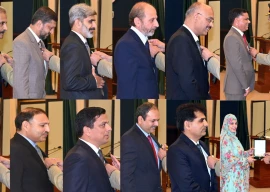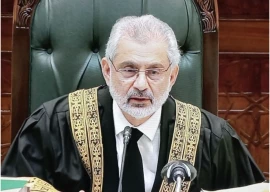
The Peshawar High Court (PHC) has expressed satisfaction after receiving a “positive response” to their proposed set of measures, including strict surveillance of hardcore militants after bail and receiving ‘test cases’ to be investigated independently.
“I have been informed that the PHC’s suggestions have received a positive response by the authorities,” said PHC Chief Justice Dost Muhammad Khan, while heading a divisional bench with Justice Fasihul Mulk, during the hearing of missing persons’ cases on Tuesday.
Deputy Attorney General Iqbal Mohmand informed the court that authorities have also been discussing handing over 15 test cases of missing persons to be investigated by the PHC – as the high court had earlier suggested – and added that minutes of the apex committee meeting, held to discuss the issue of missing persons, will also be handed over to the chief justice in his chambers.
“The home secretary and tribal affairs secretary have informed me that minutes of the meeting will be presented before the chief justice in his chambers, not in open court due to its sensitive nature,” Mohmand informed the court.
Hearing a petition filed on behalf of Mir Muhammad Arshad, the PHC has summoned assistant political agent of the Bara tehsil, Khyber Agency when Arshad’s brother, Sarfaraz Ali, revealed that he met his brother inside a lockup at the office of the political agent.
In his recorded statement, Ali stated: “I met Arshad on February 28, 2012 at the office the political agent of the Khyber Agency where he was detained along with a number of other people. He told me that he had seen the open sky after three years,” said Ali, adding he was unable to meet his brother again when employers at the office informed him that his brother has been shifted to another location for further investigation.
“In view of the latest disclosure of the brother of the detained person recorded on oath, the assistant political agent of Bara is directed to appear in person along with original records of the detainees and the complete prisoners list,” the chief justice demanded.
Ali – whose brother was a sanitary worker – alleged that police personnel picked Arshad up within the jurisdiction of the Kabuli Police Station in January 2009, when he received a call from one of his clients to meet him and receive his payment.
Case two
In another case, the deputy attorney general said both the Ministry of Defence and Ministry of Interior have denied picking up Tayef, a resident of Darra Adam Khel. He further informed the court that his brother, Arif, who was also arrested, has been shifted to the internment centre in Kohat.
“You deny picking up people but after a few days you say, the person has been shifted to an internment centre. From now on, we will not trust your statements,” remarked Justice Fasihul Mulk.
Case three
The chief justice then issued notices to the deputy attorney general, the commanding officer of Malakand Fort and the in-charge of the internment centre when counsel for Shoukat Ali asked the court to inquire whether Shoukat had been shifted to the internment centre in Malakand. His counsel said that Shoukat’s name was found the list of the persons being shifted to an internment centre.
Published in The Express Tribune, March 14th, 2012.











































COMMENTS
Comments are moderated and generally will be posted if they are on-topic and not abusive.
For more information, please see our Comments FAQ